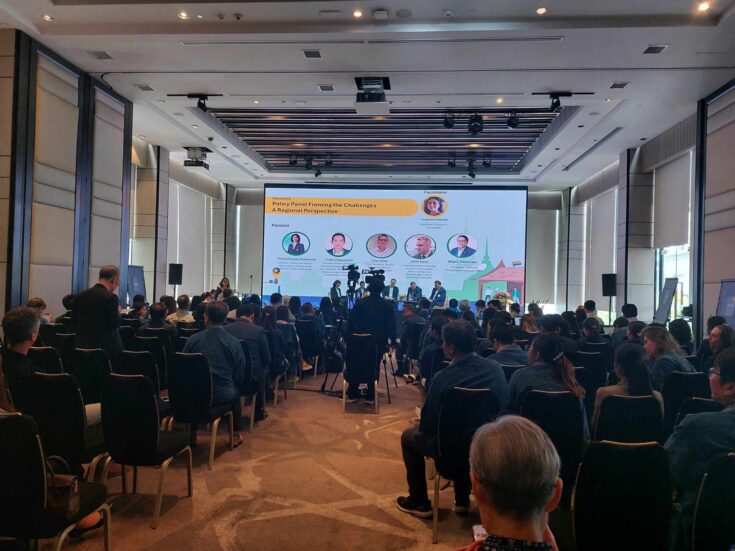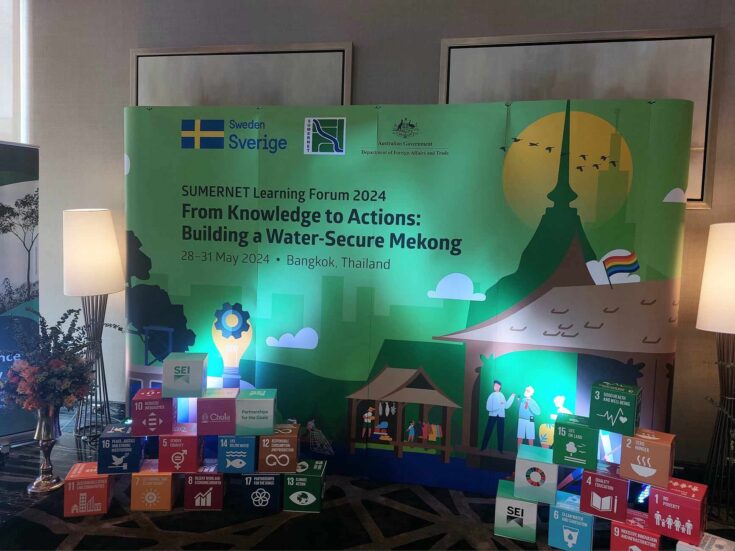
Today experts from all countries in the Mekong area met and exchanged knowledge at the SUMERNET Learning Forum 2024 in Bangkok. The event was organized in collaboration with Sweden, The Sustainable Mekong Research Network (SUMERNET) and the Australian Government Department of Foreign Affairs.
The three-day event had the title “From Knowledge to Actions: Building a Water-Secure Mekong. It was aimed at discussing how policy and research could work together to strengthen the bilateral efforts to save the biodiversity in the Mekong and therefore aid the local communities, who heavily rely on the river for survival.
20 years of collaborations
Research Advisor from the Swedish Embassy Eren Zink said in his opening remarks, that the event was a culmination of 20 years of cooperations between Sweden and SUMERNET. He underlined, that the role of Sweden is to learn from the many researchers and organizations, that have acquired important knowledge on the subject.
In a panel discussion on framing the regional challenges, Zink said, that as a Sweden is obliged to listen to the people of the region. He mentioned that water resources are limited as they are exploited for energy, transportation, waste disposal and other harmful things.
“The current state of the river is unsustainable both ecologically and socially. Decisions are often based on geopolitical advances and short-term economic interests,” Zink said.

The Swedish angle
Zink also highlighted how Sweden is a country far away, and therefore needs to rely on and get inspired by local actors in order to know how to best help the region. The Swedish International Development Cooperation Agency (Sida) focuses on protecting the fundamental rights of the people in the region. That is also why they put a great emphasis to making the voices of the Mekong heard, when decisions are to be made.
He furthermore mentioned how autocratic governments pose a threat to both journalists and researchers of the Mekong region, who are trying to give a voice to the silenced.
Zink praised the steering committee of SUMERNET. He said, that their ability to take increasingly responsibility and the diversity of the actors involved in the conversation are the reasons why Sweden has supported the project for so long. Zink stressed that 20 years is a very long time to support an issue that is so far away from Sweden.
Effects of climate change
Other topics which were mentioned by multiple panelists were the effects of climate change on the region. Experts pointed to the extreme droughts this season and that Thailand has been assessed to be in the top nine countries of the world to suffer from the most extreme weather.
SUMERNET is a regional network made up of partners from the Mekong that are committed to sustainable development. It was launched in 2005 with continued support from the Swedish Government and Sida.
The Mekong is changing
Facilitator at the event Sushmita Mandal said, that the Mekong River is changing. She mentioned increasing regulations affecting the physical changes of the river and demographic changes as the economies and region is growing. Mandal pointed to institutional changes in terms of new and expanding regional cooperations and changes in technology, which can better adapt to uncertainties.
The Mekong River is nearly 5,000km long and flows through China, Myanmar, Laos, Thailand, Cambodia and Vietnam. For many years the construction of dams by the Mekong countries have influenced the stream of the water and changed the river in terms of biodiversity.
Effects of climate change have accelerated the development and the changes are a threat to the estimated 300 million people, that rely on the river for transportation, agriculture and fishing.





